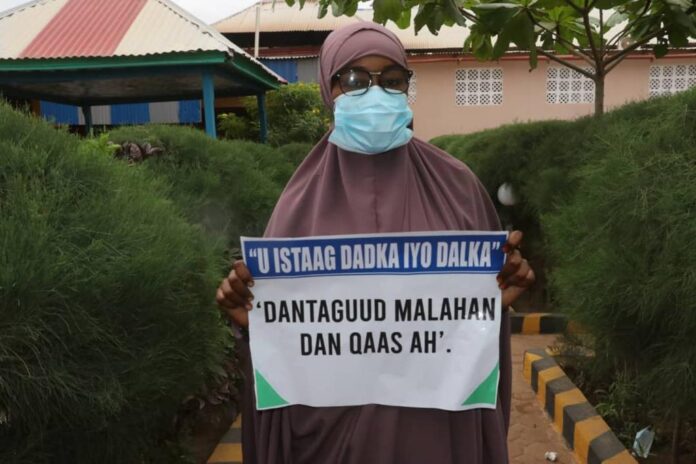The Founding Principles of the Provisional Constitution envisage a ‘participatory consultative and inclusive government’ in order to ‘ensure accountability, efficiency and responsiveness to the interests of the people.’ Furthermore, enacted legislation such as the Public Finance Management Act entrenches this constitutional dictate in the management of public resources.
The framers of the constitution contemplated this sense of participatory and inclusive government informed by the need to entrench democracy and open up governance to every citizen. Emerging from a dark history of military dictatorship that culminated in a three-decade civil war, Somalis were cautious in designing a constitution which cushioned the country from future autocracy.
Despite these crucial safeguards, subsequent governments have hardly considered public inclusion in the business of governance. In line with Uistaag Dadka iyo Dalka platform compaign of ” Danta guud ayaa ka horeeysa danaha qaaska ah” and to envisage the need of public participation in Somalia government, lets lights up the improper to get it fixed
Public Finance Management
The concept of statehood is anchored on a donation of power and authority from the people to a select group of individuals who are either elected or appointed. These individuals are then vested with these powers and authority to manage the affairs of the state on behalf of its subjects. It follows therefore that those tasked with this responsibility are also obliged to consult the citizens on how they intend to manage resources. In Somalia, the Provisional Constitution express, the Public Finance Management Act demand that the government seeks the input of the public in appropriation and spending of public money. This include seeking the thinking and comments from the public for instance during the budget making process, determination of projects to be funded within a particular fiscal period among other imperatives.
The Federal Parliament passed a $970 million for the 2023 fiscal year following a submission for approval by the Council of Ministers. This is by far the largest budget vote in Somalia’s history yet the public had no substantial input. There were no visible and witnessable public participation sessions either in Mogadishu or at the Federal States level. This effectively means the budget was drawn by few technocrats, reviewed at ministerial level and transmitted to parliament which hardly subjects the process to in-depth scrutiny and connectively There is no excuse for inclusive public participation in Somali’s public Finance management – Accountability and tranprancy is number one crucial elements in functioning governance and Presedent Hassan should revisit this and fix it
Governance and democratic processes
Another key area which calls for robust public participation and engagement is deliberation on governance and democratic processes. This includes for example the choice of an electoral model, the composition of constitutional bodies, constitutional review process among others. The constitutional review process in particular is an area which demands active participation and input from the public. Although there were limited of public engagements during the previous administration, the process was marred by conflicts between the Ministry of Justice and the Independent Constitution Review Commission (ICRIC) on which entity had the mandate to conduct the process. By law, the ICRIC is constitutionally mandated to undertake the constitutional review process but that role was usurped by the Justice Ministry. As a result, there are more than three versions of the Provisional Constitution drafts.
It is therefore incumbent upon the current administration to get it right once and for all the constitutional review process by not only widening public participation but setting the record straight on which mandated body should lead the process. Critical also for Somalia now is the electoral formula for the 2024 elections. The two administrations since the formation of the internationally recognized government in 2012 relegated the electoral question to the last half of their terms thus failing to agree and develop an acceptable and functional electoral model. President Hassan Sheikh Mohamud should now seize the earliest opportunity to open up public debate and engagements on which electoral model Somalis want. This includes reviewing the Elections Act to ensure it captures the aspirations and desires of all Somalis.
Environmental impact assessment
International best practices demand that the public should be widely involved in decision-making regarding the development of properties whose functioning could pose a significant impact on the surrounding community. This could include the setting up of factories, dams, and mining sites among others. Of note is that these projects need not necessarily be implemented by the government to require public participation. Specialised government agencies can also institute public participation regarding the development of private-sector projects in the interest of the public.
Moving forward:
the Federal Government and Federal Member States must embrace public participation as an unavoidable-important component of their governance. It builds public confidence in the government, promotes transparency, tackles corruptions and group & personal interests and instils discipline in the management of public resources and affairs.
Abdirahman Yusuf Ali is Social and Peace activist runs Uistaag Dadka iyo Dadka plarform – the platform aim to support accountability and trasprancy, better democracy and governance in Somalia. he can be reached at Uistaagdadkaiyodalka@gmail.co or Adv.fmoys@gmail.com


